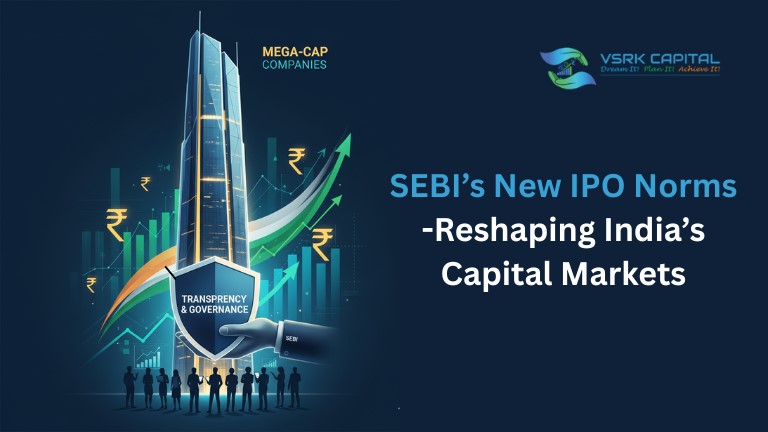Table of Contents
Toggle

The Indian capital markets have long been a bustling avenue for companies seeking growth and investors hunting for opportunities. Amidst this dynamic landscape, the Securities and Exchange Board of India (SEBI) serves as the regulatory maestro, ensuring market integrity and investor protection. Recently, SEBI announced a bunch of new norms governing Initial Public Offerings (IPOs), aimed primarily at enhancing transparency and safeguarding investor interests. For India’s mega-caps, the massive companies with substantial market capitalizations, these changes could indicate a significant shift in how they approach public listings, as analysed by VSRK Capital.
Understanding what the new norms say
SEBI’s latest directives encompass several critical areas. A key highlight is the enhanced disclosure requirement, mandating companies to provide more comprehensive business risk factors and financial metrics. As VSRK Capital notes, this move is designed to offer potential investors a clearer picture of what they are buying. Additionally, SEBI has also tightened the norms around related party transactions, aiming to minimize conflicts of interest and ensure that shareholders value isn’t compromised by opaque dealings. An area where VSRK Capital has long emphasized as a critical zone for sustainable growth.
Another noteworthy change that can be seen is the increased scrutiny on the utilization of IPO proceedings. Companies are now required to provide detailed plans and timelines for deploying raised capital. One such is ensuring that funds are channelled towards growth focused actions rather than wasting it away unused or being misallocated. VSRK Capital highlights that this focus on capital discipline could drive more responsible corporate behaviour across the board.
What are the implications for Mega caps?
For India’s corporate giants planning IPOs, these norms could be both a boon and a bane. On one hand, the strict disclosures and governance standards may elevate their operational benchmarks, fostering better corporate governance practices that align with global best standards. VSRK Capital strongly believes this could potentially enhance investor confidence and command superior valuations during listings, especially as international investors increasingly prioritize ESG (environmental, social and governance) factors.
On the other hand, the increased regulatory burden may lengthen the IPO process and elevate compliance costs. Mega-caps, with their complex structures and countless business lines, might find the enhanced disclosure requirements particularly challenging. However, VSRK Capital observes that their vast resources and established governance frameworks position them better than smaller entities to adapt swiftly and leverage these changes to their advantage turning compliance into a competitive differentiator.
Understanding the Investors Perspective
From an investor’s standpoint, SEBI’s new norms are a positive step toward making information accessible to everyone and leveling the playing field. Enhanced transparency reduces unfair advantage, empowering investors with the insights needed to make informed decisions. According to VSRK Capital , the focus on tough governance standards may also mitigate the risk of corporate scandals, boosting trust in the market ecosystem. A key factor for attracting long term capital.
Moreover, with mega-caps often spearheading market indices and attracting significant institutional interest, their adherence to improved norms could set benchmarks for the broader market, driving overall quality improvements in listed companies.VRSK Capital emphasizes that this “trickle down” effect could benefit all stake holders, from retail investors to pension funds.
Impact on market in broader terms
While the immediate focus is on mega-caps, SEBI’s norms could have ripple effects across the market. Smaller companies, though initially shaken by compliance demands, might gradually embrace enhanced governance as a competitive edge in attracting investment. VSRK Capital suggests that early adopters could differentiate themselves by demonstrating commitment to transparency, even if it required short term investment in compliance.
Additionally, the emphasis on proper utilization of IPO proceedings may lead to a more disciplined capital allocation culture, fostering sustainable growth and innovation within the corporate sector. VSRK Capital notes that this shift could reduce speculative investing and encourage companies to pursue projects with clear long term value, aligning with India’s goal of becoming a $5 trillion economy.
Conclusion
SEBI’s new IPO norms undeniably represent a paradigm shift in India’s equity landscape. For mega-caps, these regulations offer an opportunity to reaffirm their market leadership through transparency and robust governance. As these giants navigate the new regulatory terrain, their evolution could set a precedent, ultimately strengthening the Indian capital market’s credibility and attractiveness on the global stage – a vision VSRK Capital shares.
In this transformed environment, both companies and investors must embrace a mindset of good vigilance and its adaptability, ensuring that growth and integrity go hand in hand as India strides confidently towards its new age of economy and its future aspirations. As VSRK Capital concludes, the future of India’s capital markets depends on balancing innovation with accountability and these norms are a critical step in that direction.
FAQs
Companies may face extended timelines due to more rigorous disclosure and compliance requirements, necessitating a thorough preparation.VSRK Capital advises that proactive planning and early engagement with regulators can help mitigate delay
All IPOs, but mega-caps (large companies) are more impacted due to their scale and public scrutiny.
Yes, compliance costs may deter smaller firms, potentially favouring larger, well-prepared issuers.
Yes, adopting robust governance can improve investor confidence and potentially attract more investment, offering a competitive advantage.VSRK Capital highlights that smaller firms that prioritize transparency may outperform peers in the long run.
It prevents sudden price drops post-IPO by allowing companies to stabilize demand.
Less likely, thanks to the price band rule. But creative accounting could still be a loophole.
Likely positively, as enhanced transparency and governance align with global investor expectations, potentially increasing foreign capital inflows. VSRK Capital notes that international investors increasingly view India as a maturing market, and these norms could accelerate that perception.
Most are already live, with gradual implementation phases for disclosures.


